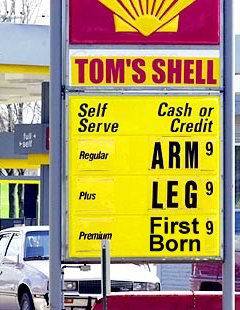 So, I've been rolling this around in my spacious noggin for several days now. And finally, I have come up with the solution to our high gas prices.
So, I've been rolling this around in my spacious noggin for several days now. And finally, I have come up with the solution to our high gas prices. In a nutshell, the price you pay at the pump will be commensurate with the EPA officially published mileage rating for your vehicle.
What will this do to pricing at the pump? Nothing. However, nothing we as consumers do right now seems to impact prices at the pump anyway. What this WILL do, is allow responsible users to pay LESS, and the ones who want to drive big crap on our roads will pay MORE.
Here is how it will work:
Say household ONE has one vehicle: a Toyota Camry. The EPA published mileage for that car is 22 (for example)
Say household TWO has one vehicle: A Ford Excursion. The EPA published mileage for that car is 16 (for example)
Say household THREE has one vehicle: A Honda Civic Hybrid. The EPA published mileage for that car is 43 (for example)
Say household FOUR has TWO vehicles: a Camry and a Ford F250 Truck. EPA mileage on the Camry is 22, and the F250 is 15 (for example). The AVERAGE mileage rating (or in my program, the MILEAGE INDEX), for that household is 18.5.
Okay. So, depending on your MILEAGE INDEX, the price at the pump is prorated for you. The bottom line result is that if you drive a hummer, you pay (for example) 50 cents per gallon OVER the base "sign price" than the Camry family. If you drive a civic hybrid, you pay (for example) 15 cents LESS than the base sign price.
All vehicles registered to you will go into calculating your specific INDEX. Larger vehicles needed for commercial use could be exempted, by application, as would agri-vehicles, etc. If you have a car registered, but you don't drive it - it's parked, or seasonal, etc, there would be a way to calculate it into your index, based on the time it is insured for driving - days per year.
Get it? So, the problem I see with this program is programming your index at the pump. You would receive a little button, like the Discover Card pay button thing that looks like a watch battery attached to a fob, or some other item to go on your key ring. This button would store your index information, along with your name, and the names of those who drive and pay for gas in your family... this button would need to match up with the name on your credit card when you swipe it at the pump.
This "button" method does propose the problem of black market buttons that would become quickly available through nefarious means.
Therefore, another option would be to have issued to you a very small barcode sticker that would be attached inside your filler flap. There would then need to be a handheld reader/scanner that would perform the same function as the "button" method, operated by the gas buyer at the time of purchase. This would eliminate the black market for Index Buttons. It's permanently attached to your car, and embedded into the barcode. The is no way for an onlooker to tell what your index is. Scanning another car's sticker while at the pump to provide a more favorable index price would be a criminal offense.
Anyway, the scanned code would have to match some other info you provide at the pump anyway, to help cut down that sort of activity. There are kinks and costs to be worked out - most notably almost the entire paradigm of "the gas pump". Expensive and tedious. But it's a thought.
Would this make (average, or base) prices go down? No. What it WOULD do, is help our people to feel the need to conserve energy and help cut down our thirst for that precious and finite resource, through choosing better and fewer vehicles to drive, and to drive them less often. The only language most of us consumers understand is that attached to our wallet.
How's THAT for all you "big brother" conspiracy nutjobs out there???
:)
2 comments:
This sounds way too complex to administer and far too easy to spoof. We'd suddenly have a huge black market for forged bar codes. If we're convinced that government regulation is the best way to do this, it seems that it would be far simpler to just charge the fee with the annual registration. After all, people driving gas guzzlers already pay more at the pump simply by volume usage.
Of course, you are right. However, I don't think paying a "tax" at registration is enough pain to make a significant enough impact. It would be most impactful if the pain was felt directly at the pump. There is already a "gas-guzzler" tax, is there not? Maybe I'm wrong about that, which is exactly my point there - not enough emotional impact to make a difference.
Post a Comment